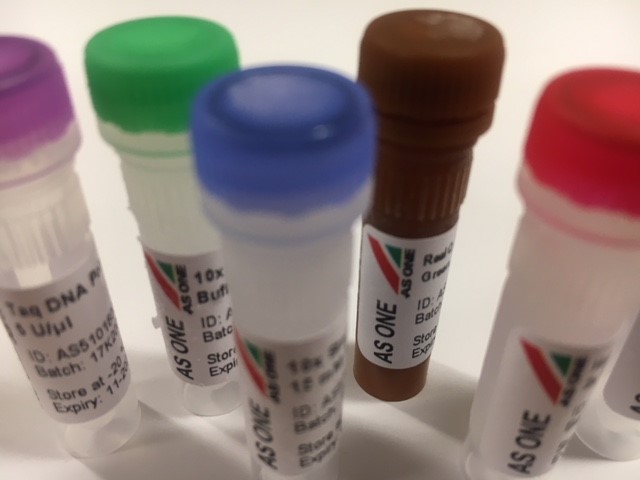Description
Red-Taq Polymerase 2x Master Mix
2x Master Mix Kit (1.5 mM MgCl2)
Cat. No. |
Reactions | R-Taq DNA Polymerase | MgCl2 |
| AO180303 |
500 |
2x Master Mix |
1.5 mM |
| AO180306 |
2,500 |
2x Master Mix |
1.5 mM |
| AO180307 |
5,000 |
2x Master Mix |
1.5 mM |
| AO180308 |
10,000 |
2x Master Mix |
1.5 mM |
| AO180309 |
20,000 |
2x Master Mix |
1.5 mM |
Store at -20°C. For in vitro laboratory use only
General Description
AS ONE R-Taq DNA Polymerase Mix is a ready-to-use 2x reaction mix. Simply add primers, template, and water to successfully carry out primer extensions and other molecular biology applications.
AS ONE Taq polymerase, the NH4+ buffer system, dNTPs, inert red dye, stabilizer, and magnesium chloride are conveniently present in the R-Taq DNA Polymerase Mix.
AS ONE R-Taq DNA Polymerase Mix offers several advantages. Set up time is significantly reduced. The chance of contaminating component stocks is eliminated. Reduction of reagent handling steps leads to better reproducibility. Standard tests can be set up with the confidence that results will be consistent every time.
There is no need to use a separate loading dye. Simply load a portion of the reaction product onto an agarose gel for electrophoresis and subsequent visualization. The red dye front runs at 1000-2000 bp on a 0.5-1.5% agarose gel.
Composition of 2x R-Taq Master Mix
- 150 mM Tris-HCl pH 8.5, 40 mM (NH4)2S04, 3 mM MgCl2, 0.2% Tween 20Ò
- 4 mM dNTPs
- 2 units/µL B-Bridge R-Taq polymerase
- Inert red dye and stabilizer
Suggested Protocol using R-Taq 2x Mix
This protocol serves as a guideline for primer extensions. Optimal reaction conditions such as incubation times, temperatures, and amount of template DNA may vary and must be individually determined.
Notes:
- Set up reaction mixtures in an area separate from that used for DNA preparation or product analysis. Work on ice at all times.
- The final MgCl2 concentration of this 2x Master Mix is 1.5 mM. If more than 1.5 mM MgCl2 is required, use 25 mM MgCl2 (may be purchased separately) to adjust the Mg2+
Additional volume (µl) of MgCl2 per 50 µl reaction
| Final MgCl2 conc.
in reaction (mM) |
1.5 | 2.0 | 2.5 | 3.0 | 3.5 | 4.0 | 4.5 |
| Additional volume
of 25 mM MgCl2 per reaction (µL): |
0 | 1 | 2 | 3 | 4 | 5 | 6 |
- Thaw R-Taq 2 Master Mix and primers. It is important to thaw the solutions completely and mix thoroughly before use to avoid localized concentrations of salt. Keep all components on ice.
- The table below shows the reaction set up for a final volume of 50 m If desired, the reaction size may be scaled down. Use 10 µl of the R-Taq 2x Master Mix in a final volume of 20 µl.
- Important: Spin R-Taq Master Mix vials briefly before use.
- Set up each reaction as follows:
Component |
Vol./reaction | Final Conc. |
| R-Taq 2x Master Mix | 25 µL | 1X |
| 25 mM MgCl2 | 0 µl (0-7 µl) | 1.5 mM (1.5-5 mM) |
| Primer A | 1 µL (0.5-5 µl) | 0.2 µM (0.1–1.0 µM) |
| Primer B | 1 µL (0.5-5 µl) | 0.2 µM (0.1–1.0 µM) |
| Distilled Water | Variable | – – – – |
| Template DNA | Variable | Genomic DNA 50 ng (10-500 ng)
Plasmid DNA 0.5 ng (0.1-1 ng) Bacterial DNA 5 ng (1-10 ng)
|
| TOTAL volume | 50 µL | – – – – |
- Mix gently by pipetting the solution up and down a few times.
- Program the thermal cycler according to the manufacturer´s instructions. For maximum yield and specificity, temperatures and cycling times should be optimized for each new template target or primer pair.
- Place the tubes in the thermal cycler and start the reaction.
Three- step PCR Program:
| Cycles | Duration of Cycles | Temperature |
| 1 | 2-5 minutesa | 95°C |
| 25-35 | 20-30 secondsb
20-40 secondsc 30 secondsd |
95°C
50-65°C 72°C |
| 1 | 5 minutese | 72°C |
a Initial denaturation step. Optional, but recommended for genomic DNA
b Denaturation step: Heating the DNA template disrupts the hydrogen bonds yielding ssDNA.
c Annealing step: Primers anneal to ssDNA template. Typically annealing temperature is 3-5°C below the Tm of the primers.
d Extension/elongation step: R-Taq DNA polymerase synthesizes a new DNA strand complementary to the DNA template. Extension time depends on length of DNA fragment to be amplified. At optimum temperature the DNA polymerase will polymerize 1000 bases per minute.
e Final elongation step: After the last PCR cycle to ensure that any remaining ssDNA is fully extended.



Reviews
There are no reviews yet.